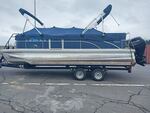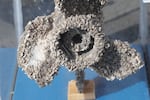Oregon officials have discovered invasive quagga mussels on a pontoon boat that was transported to the state from Nevada, marking the first such finding of the year.
An official from the Oregon Department of Fish and Wildlife told the Capital Chronicle the owner purchased the boat at Lake Mead, which is infested with quagga mussels. Rick Boatner, an invasive species expert, said the owner had the boat decontaminated at Lake Mead but that they “didn’t do a very good job” of cleaning it.

Oregon inspectors found invasive quagga mussels on a pontoon boat brought into Oregon from Nevada.
Oregon Dept. of Fish and Wildlife
Oregon officials in Ashland, where the boat was inspected, found dead and live specimens. The latter is particularly worrying because each mussel can reproduce millions of others, Boatner said.
Voracious feeders, the mussels consume food that juvenile fish including salmon need to survive. They also attach to pipes, clogging infrastructure used for drinking water, irrigation and hydropower. It can cost billions of dollars to keep these systems running once the mussels have taken hold, Boatner said.
“If they get established, they’re bad news for the environment and for the economy,” Boatner said.
Quagga and zebra mussels, a similar pest, are native to Eastern Europe but have been transported across the globe by ship through ballast water, according to Oregon State University. They’ve spread from there by attaching to boat hulls, motors and engine cooling intake lines or pipes, or by surviving as larvae in boats’ water-holding areas, OSU said.
They first appeared in the Great Lakes in the late 1980s, then turned up in Nevada and California in the late 2000s. Last year, quagga mussel larvae were found in the Snake River below Twin Falls, Idaho, prompting alarm that they could spread in the Columbia River Basin. Idaho officials destroyed them and subsequent tests indicated they were eradicated. During spawning season, wildlife officials search for them in bodies of water by dragging something like a coffee filter through the water and then checking it in a lab for signs of the mussels.
“They do it all through the spawning season,” Boatner said. “We have never discovered anything in Oregon or Washington.”
Wildlife officials find the mussels on eight to 16 boats every year. Since the program started in 2010, officials have found quagga or zebra mussels, a similar pest, on 168 watercraft out of nearly 120,000 inspections.

A boat propeller encrusted with invasive quagga mussels that was found in Nevada is displayed during a demonstration of a boat inspection for reporters in this Tuesday, Feb. 25, 2020 file photo taken at a boat launch in Olympia, Wash.
Ted S. Warren / AP
Boatner urged boatowners to get their vessels inspected to continue to keep the mussels out of the state.
“If we don’t find anything, the inspection is quick, three to five minutes,” Boatner said. “If we do find something, like in this case, we can do a decontamination right there on the spot.”
That involves scraping the boat and then blasting it with high-pressure hot water. The boats then have to dry for up to 30 days.
Inspection stations
Oregon has two year-round boat inspection stations in Ashland and Ontario. There are also seasonal stations in Brookings, Klamath Falls, Lakeview and Umatilla, which open the first week of May. Find more information here.
If you find the mussels on your watercraft, report them to the Oregon Invasive Species hotline at 866-INVADER or go here.
This story was originally published by the Oregon Capital Chronicle.
Oregon Capital Chronicle is part of States Newsroom, a network of news bureaus supported by grants and a coalition of donors as a 501c(3) public charity. Oregon Capital Chronicle maintains editorial independence. Contact Editor Lynne Terry for questions: info@oregoncapitalchronicle.com. Follow Oregon Capital Chronicle on Facebook and Twitter.